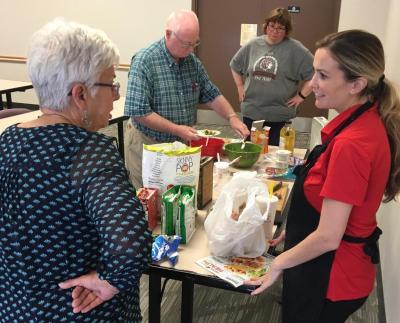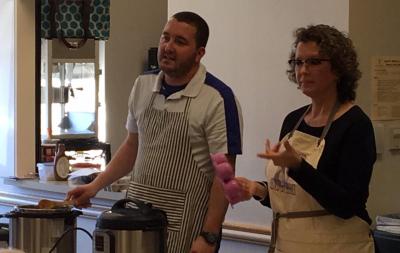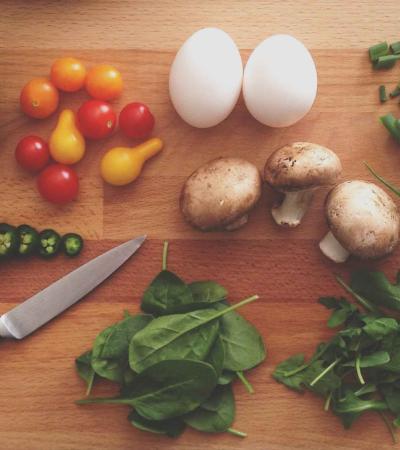Winterset is a rural community of approximately 5,200 in central Iowa, about 30 miles southwest of Des Moines. Residents can dine at the few eateries in town, but with the abundance of gardens and fresh ingredients available, patrons are often looking for ideas to create their own meals.

The library has responded with a variety of informative and tasty cooking demonstrations and classes, such as the ones below. The classes include samples, recipes, menus, shopping lists and often information about apps to use later.
Your ability to host some of these programs will of course be dictated by your faciliaties — but if you are short on cookspace, don't underestimate the usefulness of hotplates. Our library is lucky to have a meeting room with a kitchenette, including an oven, refrigerator, sink and microwave, but the kitchenette serves mainly as a prep and storage area. Our presenters using large, portable hotplate burners in the larger room for the demonstrations.
Cooking demos
Even in very small communities, you likely have immense culinary talent to draw from. We have utilized the expertise of regional author, blogger and foodie Darcy Maulsby, who presented an overview of Iowa’s culinary history with a follow-up program on making easy harvest meals to help meet the needs of our busy agricultural families during their crunch time.
We have also invited cooking demos from a local café owner, whose Around the World series featured cuisine from different countries to coincide with the 2019 “A Universe of Stories” summer reading theme. The presenter included information about language, geography, history and native foods/spices of each nation so participants could understand why and how foods are prepared and preserved in those areas. Attendees were invited to share their family stories, food traditions and recipes.
Grocery store partnerships
Did you know that many supermarkets have registered dieticians on staff? We collaborated with two local grocery stories, who were able to send their registered dietitians to provide cooking and food-related programs for all ages.
Participants appreciated the opportunity to learn the nutritional value, cost and preparation methods, as well as getting a little sample before buying.

Equipment demos (behold, the Instant Pot!)
With the popularity of newer kitchen appliances like the Instant Pot and air fryer, we sought out local cooking enthusiasts who adopted this equipment early and were willing to teach others so they could get over their fears or indecisiveness about purchasing or using them at home.
It was a good hunch. Our Instant Pot classes filled to capacity quickly, so we offered additional sessions — as well as IP 2.0 classes at the request of the cooks who were now eager to learn more. The air fryer class was met with equal interest.
Health classes with our county extension office
Our county extension office has been a great partner. Our area’s human sciences specialist for nutrition and health has a wide assortment of ready-made programs.
At patron request, our extension partner offered a short Healthy and Homemade series with slow cooking, freezer meals and cooking for one or two.
Advice
What have we learned in the process? Some words of advice:
- Don’t be afraid to ask for what you need. Most of our presenters worked for free, so we paid the cost of their ingredients with a small honorarium.
- Extension cords and surge protectors are likely needed if using hot plates.
- Encourage presenters to bring extra air fryers, Instant Potss, additional equipment, etc.
- Create an emergency box with simple kitchen tools, measuring cups, wax paper, etc., to help with the presenter’s last-minute needs.
- Plan for food smells in the library.
- Test and /or check sensitivity of fire alarm and sprinklers.
- Make sure fire safety equipment is nearby.
- Provide samples if possible, and be prepared with plates, napkins and utensils.
- Schedule plenty of extra time for Q&A.
- Registration is recommended for planning purposes.
- Schedule a staff member or volunteer, as cooks often need help with the prep.
- Be sure to check your local laws and ordinances regarding licensing, food prep and food service.
Jean Bosch is the director of Winterset Public Library in Winterset, Iowa. This blog post is part of a series, organized by Iowa State Library, exploring programming in small libraries throughout the state.


